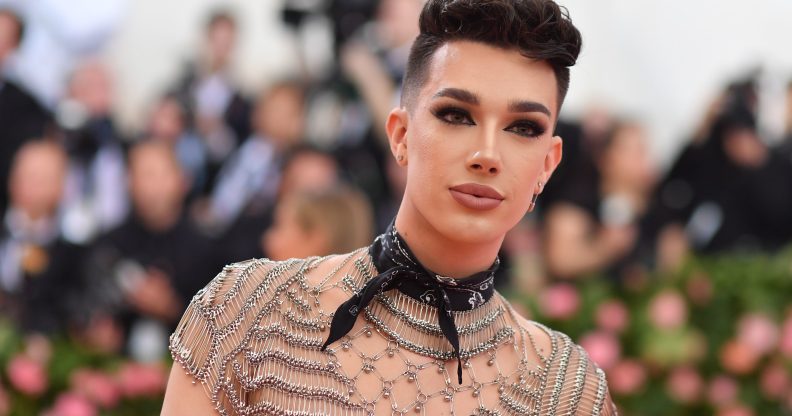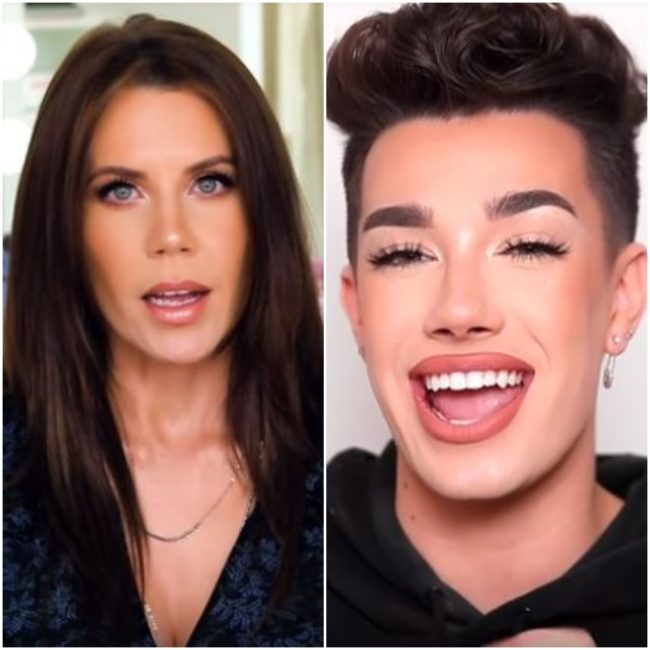The condemnation of James Charles is tinged with homophobia

James Charles arrives for the 2019 Met Gala at the Metropolitan Museum of Art on May 6, 2019, in New York. (ANGELA WEISS/AFP/Getty)
Even those of us who last bought make-up when everyone thought Dream Matte Mousse was a good idea cannot have failed to notice the ongoing feud between YouTube beauty gurus James Charles and Tati Westbrook, which has been all over the internet for the past week.
Before last week, James Charles had the the most popular beauty channel on YouTube, but the 19-year-old vlogger has since lost over three million subscribers and been unfollowed on social media by multiple celebrities after fellow beauty influencer Tati Westbrook publicly severed her friendship with him, accusing him of dishonest business practises and predatory behaviour in a 43-minute long video posted last weekend.
Since the video was posted, a number of other people have come forward to give their accounts of the openly gay Charles’s behaviour towards various straight men. Singers Zara Larsson and Olivia O’Brien have stated that he repeatedly DM’d their boyfriends despite knowing that they were in heterosexual relationships, while fellow YouTuber Jeffree Star said that his boyfriend banned Charles from their house and model Gage Gomez has claimed that Charles took advantage of his confusion surrounding his sexuality.
Some have questioned the severity of some of these claims—DM’ing somebody’s boyfriend is rude, sure, but without knowing what he said, it’s difficult to judge whether it’s really a crime. Yet multiple accusations should never be ignored and predatory behaviour of any kind should always be condemned. And by all accounts James Charles should probably have been cancelled a while back for his views on race and transgender people, not to mention his recent use of the phrase ‘influencer representation’ and frankly not-nearly-camp-enough Met Gala look. (He wore assless chaps to Coachella and this is supposed to be his best effort at camp?)

Tati Westbrook (L) and James Charles (R) (YouTube)
Nevertheless, the glee that certain corners of the internet seem to have taken at the influencer’s demise seems to me to be motivated more by gay panic and homophobia than it does by a genuine concern about Charles’s actions.
For one thing, it seems that this has become such a high-profile case that extends beyond the confines of the beauty influencer community in part because of the outrage of straight men.
It is galling to see straight men jump at the chance to condemn a gay male predator while remaining silent on high profile cases of straight men preying on women, and infuriating to see how easily people believe the victims of gay male harassment compared to the victims of straight men. This seems to me to be a result of the harmful and homophobic stereotype of the predatory gay man, rather than any propensity for straight men to usually care about sexual harassment.
There are many reasons to dislike influencer culture, but it seems to me that James Charles is disliked more than most in part due to his refusal to conform to gender norms. I find it doubtful that the reaction from straight men would have been so great if he was more masculine and his fame wasn’t derived from an industry more typically associated with women and effeminacy.
So, while it saddens me that Charles has been reckless with the responsibilities that he has as a role model for young queer people, I find it equally saddening that so many people outside of the queer community have taken such pleasure in his demise, because it seems to be motivated much more by homophobic stereotypes regarding gay men—and particularly effeminate gay men—than it does by any real concern for his behaviour.
Rosie Hewitson is freelance arts and culture writer with bylines in VICE, G2, IndyVoices, Noisey, Dazed, ShortList and PinkNews.
The views reflected in this article do not necessarily reflect the views of PinkNews.

